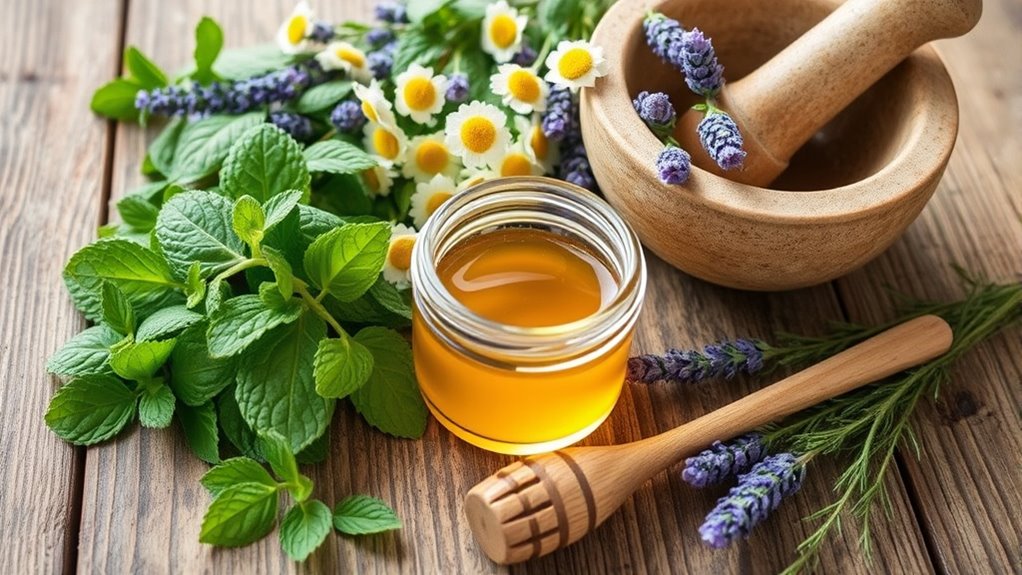For effective herbal headache remedies, try using peppermint or lavender essential oils to ease tension quickly. Drinking herbal teas like chamomile, ginger, or feverfew can reduce inflammation and relax your muscles, preventing worsening headaches. Keep these remedies handy for prompt use at the first sign of pain. Incorporating them into your daily routine can provide natural relief and promote overall well-being. With some simple tips, you’ll discover ways to manage headaches more comfortably—explore further for more helpful insights.
Key Takeaways
- Peppermint and lavender essential oils can provide quick, natural headache relief through inhalation or diffusion.
- Drinking herbal teas like chamomile, ginger, or feverfew helps reduce inflammation and relax tense muscles.
- Feverfew is a proven herbal remedy for preventing migraines and alleviating headache symptoms.
- Combining herbs such as peppermint and chamomile offers synergistic benefits for headache relief.
- Using herbal remedies promptly at the first sign of pain enhances their effectiveness and promotes overall well-being.

When a headache strikes, many people turn to herbal remedies as a natural way to find relief. You might discover that certain herbal approaches can ease your pain without the side effects often associated with medication. Aromatherapy benefits, for example, are well-known for their ability to help reduce headache symptoms. Inhaling essential oils like peppermint or lavender can provide quick relief by promoting relaxation and improving circulation. You can add a few drops of these oils to a diffuser or simply inhale directly from a tissue for immediate soothing. The calming aroma helps to ease tension and can even reduce the intensity of your headache.
In addition to aromatherapy, herbal tea blends serve as a gentle, effective remedy. Sipping on a warm cup of herbal tea not only keeps you hydrated but also delivers anti-inflammatory compounds that can help diminish headache pain. Popular herbal teas like chamomile, ginger, or feverfew are known for their calming and pain-relieving properties. Chamomile, with its soothing effects, can relax tense muscles and reduce stress, both common triggers for headaches. Ginger tea contains bioactive compounds that fight inflammation and improve blood flow, easing headache symptoms. Feverfew, often brewed into a tea, is a traditional remedy praised for its ability to prevent migraines and reduce their severity.
You can prepare herbal tea blends tailored to your preferences, combining herbs like peppermint and chamomile for a double benefit—peppermint’s cooling sensation and chamomile’s calming effects. Drinking these teas consistently during a headache can sometimes prevent the pain from worsening. Remember to avoid overly sweetening your herbal teas, as excess sugar might contribute to headaches. Instead, opt for natural flavorings like honey or lemon if needed.
Both aromatherapy benefits and herbal tea blends are easy to incorporate into your routine when you feel a headache coming on. Keep a small bottle of essential oil in your bag or at your bedside for quick access. Likewise, stock your kitchen with dried herbs for quick brewing. Knowing store hours can help you plan when to purchase your herbal remedies, ensuring you always have what you need on hand. These natural remedies can be powerful allies, offering relief without drugs. They work best when used at the first sign of pain, helping to relax tense muscles, improve circulation, and reduce stress. By integrating these simple, effective herbal remedies into your daily life, you gain a gentle, drug-free way to manage headaches and promote overall well-being.
Frequently Asked Questions
Are Herbal Remedies Safe for Children With Headaches?
You’re wondering if herbal remedies are safe for children with headaches. It’s important to consider herbal safety because not all herbs are suitable for kids, and some may cause adverse effects. Always consult a healthcare professional before giving any herbal treatments to guarantee they won’t harm your child’s health. Monitoring your child’s response and sticking to recommended doses helps protect their well-being while exploring natural options for headache relief.
How Long Do Herbal Remedies Take to Relieve Headache Pain?
Think of herbal remedies as a gentle sunrise—they don’t happen overnight. The timing effectiveness varies, but most people start noticing symptom relief within 30 minutes to an hour. For some, it might take longer, up to a few hours, depending on the remedy and individual factors. Keep in mind, the symptom relief duration can also differ, typically lasting a few hours, so it’s best to plan accordingly for ongoing relief.
Can Herbal Remedies Replace Conventional Headache Medications?
You might wonder if herbal remedies can replace conventional headache medications. While some herbs have strong herbal potency and can effectively reduce pain, they aren’t always a complete substitute, especially in severe cases. Plus, herbal remedies can interact with medications, so you should consult your healthcare provider first. Remember, herbal options can complement your treatment, but relying solely on them without medical advice may not address underlying issues.
Are There Any Herbal Remedies for Chronic or Severe Headaches?
Well, in this day and age, you might wonder if herbal remedies can tackle chronic or severe headaches. You should know that certain herbal supplements, like feverfew or butterbur, could help, but herbal supplement interactions and dosage considerations are key. Always consult a healthcare professional before starting, as incorrect doses or interactions with medications might worsen your condition. Don’t rely solely on herbs; proper diagnosis and treatment are essential.
How Do I Choose the Right Herbal Remedy for My Headache Type?
When choosing the right herbal remedy for your headache, start by understanding your headache classification—whether it’s tension, migraine, or cluster. Consider herbal potency; some herbs are stronger and may suit severe headaches, while milder ones work for less intense pain. Research the specific herbs known for your headache type, and consult a healthcare professional to guarantee safety and effectiveness. Tailoring your choice helps you find relief effectively.
Conclusion
While some may doubt herbal remedies’ effectiveness, many find relief through natural options like peppermint or feverfew. Remember, individual responses vary, so it’s wise to consult a healthcare professional before trying new treatments. Incorporating these herbal remedies into your wellness routine can be a gentle, effective way to manage headaches without relying solely on medication. With patience and proper guidance, you might discover a soothing, sustainable solution that works best for you.










